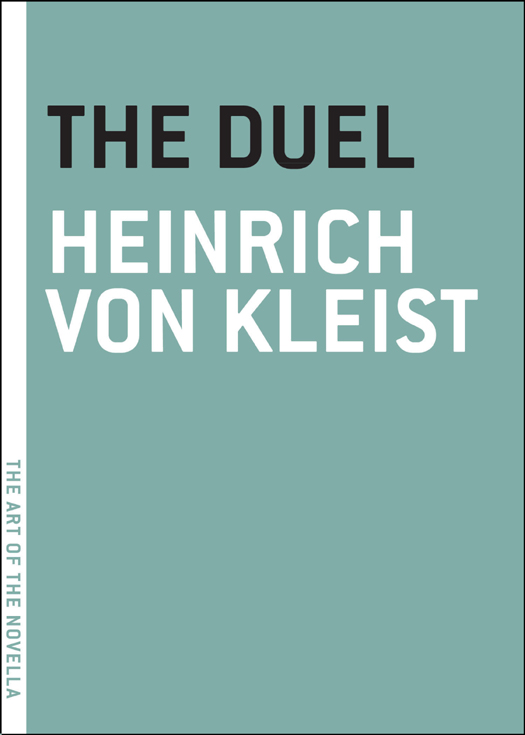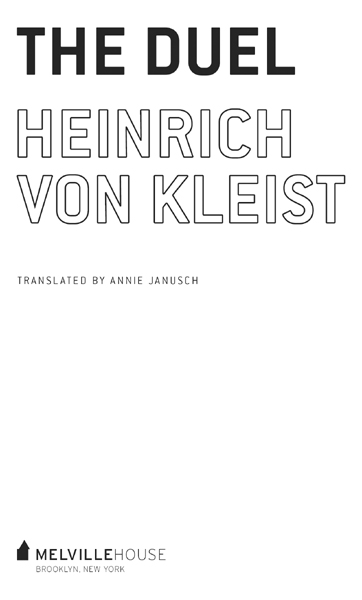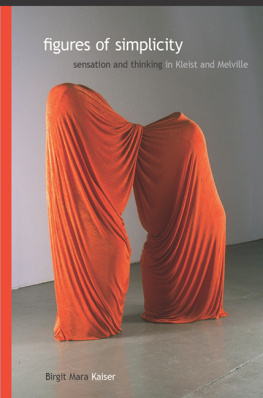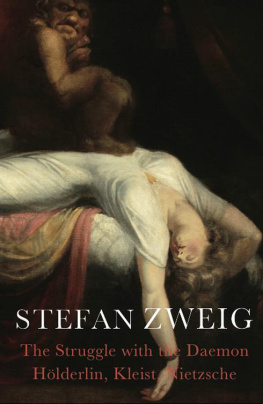Kleist - The duel
Here you can read online Kleist - The duel full text of the book (entire story) in english for free. Download pdf and epub, get meaning, cover and reviews about this ebook. City: Brooklyn, N.Y, year: 2011, publisher: Melville House, genre: Art. Description of the work, (preface) as well as reviews are available. Best literature library LitArk.com created for fans of good reading and offers a wide selection of genres:
Romance novel
Science fiction
Adventure
Detective
Science
History
Home and family
Prose
Art
Politics
Computer
Non-fiction
Religion
Business
Children
Humor
Choose a favorite category and find really read worthwhile books. Enjoy immersion in the world of imagination, feel the emotions of the characters or learn something new for yourself, make an fascinating discovery.

- Book:The duel
- Author:
- Publisher:Melville House
- Genre:
- Year:2011
- City:Brooklyn, N.Y
- Rating:4 / 5
- Favourites:Add to favourites
- Your mark:
- 80
- 1
- 2
- 3
- 4
- 5
The duel: summary, description and annotation
We offer to read an annotation, description, summary or preface (depends on what the author of the book "The duel" wrote himself). If you haven't found the necessary information about the book — write in the comments, we will try to find it.
The duel — read online for free the complete book (whole text) full work
Below is the text of the book, divided by pages. System saving the place of the last page read, allows you to conveniently read the book "The duel" online for free, without having to search again every time where you left off. Put a bookmark, and you can go to the page where you finished reading at any time.
Font size:
Interval:
Bookmark:


THE DUEL BY HEINRICH VON KLEIST
ORIGINALLY PUBLISHED IN GERMAN AS DER ZWEIKAMPF
IN THE COLLECTION ERZHLUNGEN IN 1810
TRANSLATION 2011 BY ANNIE JANUSCH
2011 MELVILLE HOUSE PUBLISHING
FIRST MELVILLE HOUSE PRINTING: JUNE 2011
MELVILLE HOUSE PUBLISHING
145 PLYMOUTH STREET
BROOKLYN, NY 11201
WWW.MHPBOOKS.COM
THE LIBRARY OF CONGRESS HAS CATALOGED THE PAPERBACK EDITION AS FOLLOWS:
KLEIST, HEINRICH VON, 1777-1811.
[ZWEIKAMPF. ENGLISH]
THE DUEL / HEINRICH VON KLEIST; TRANSLATED BY ANNIE JANUSCH.
P. CM.
eISBN: 978-1-61219-074-7
I. JANUSCH, ANNIE. II. TITLE.
PT2378.Z913 2011
838.609DC23
2011021336
v3.1
Toward the end of the fourteenth century, as night was falling on the feastday of St. Remigius, Duke Wilhelm von Breysachwho had been living in enmity with his half-brother, Count Jakob Rotbart, ever since the Dukes clandestine marriage to a countess reputedly below his social rank, Katharina von Heersbruck of the family Alt-Hningenreturned from a meeting with the German Kaiser in Worms, at which the Duke had persuaded the Kaiser to legitimize as his one natural son, Count Philip von Hningen, who had been conceived before marriage, the Dukes other children born in wedlock having died. Envisioning what the future now held, the Duke felt more content than he had during the entire course of his reign, but just as he reached the park behind his castle, an arrow shot out suddenly from the darkness of the hedges, drilling through his body until it lodged tightly beneath his breastbone. Seized by this event, Sir Friedrich von Trota, the Dukes chamberlain, carried him with the help of the other knights into the castle, where an assembly of the Reichs vassals was called by the Dukes distraught wife, and there in her arms the Duke gathered his remaining strength to deliver a final address in which he set forth the Kaisers decree. It was not without lively opposition, however, that the vassals carried out the Dukes last authoritative will, as the rule of law would have called for his half-brother, Count Jakob Rotbart, to reap the crown. After furnishing the Kaisers consent, and on the condition that the Dukes wife be appointed guardian and regent until the young prince came of age, Count Philip was indeed recognized as heir to the throneand the Duke lay back and died.
And so the Duchess ascended the throne, quite without ceremony, and sent but an envoy to notify her brother-in-law, Count Jakob Rotbart, of the thrones new heir. What several knights of the court conjectured would happenbelieving theyd cracked the Counts impervious demeanorhappened, or so it seemed: Count Jakob Rotbart, in cunning assessment of this news, rose above the injustice done him by his brother, or, at least he refrained from contesting the Dukes last will, and instead offered his congratulations to his nephew on the throne he had acquired. Rotbart gathered the members of the Duchesss envoy congenially to his table and regaled them with how he had lived freely and independently in his castle since the death of his wife, who had left him a kingly sum; how he delighted in the company of his neighboring noblemens wives as well as wine from his own vineyards and a jaunty hunt with friends; and how he planned a crusade to the Holy Land to atone for the sins of an impetuous youth (alas, his trespasses only increased with age, he conceded), which would be the last endeavor he looked forward to at the end of his life.
Rotbarts ambivalence toward the throne sparked bitter rebuke from his two sons, who, having been brought up with their own aspirations to succession, now found their hopes unexpectedly dashed. Rotbart gave the insolent youths a terse and derisive reprimand, ordering them to accompany him into the town for the occasion of their uncles funeral and to stand at his side while the Duke was laid to rest in the family vault. After the Count had paid his respects to his nephew, the young princein the throne room of the castle, and in the presence of the duchess and the courts other dignitarieshe returned to his castle, having declined the duchesss offers of offices and honors, and accompanied by the blessings of the people, who revered him now all the more for his show of graciousness and temperance.
With her first obligation as regent having reached an unexpectedly tidy end, the Duchess now turned her attention toward the pressing task of finding her husbands murdererswhole packs of them, it was rumored, had been seen in the park. She and her Chancellor, Sir Godwin von Herrthal, began their investigation by examining the fatal arrow, which revealed nothing as to the identity of its owner except perhaps for its unusually exquisite craftsmanship. Crisp and brilliantly rippling feathers were tucked into a slender yet sturdy shaft that was finely worked from dark walnut. The arrowhead was clad in gleaming brass; only the very point, sharp as a fishbone, was of steel. It appeared to have been manufactured for the armory of a wealthy aristocrat, who either was embroiled in frequent feuds or was an avid hunter. Since the date engraved on the arrowhead indicated its recent manufacture, however, the Duchess, at the Chancellors advice, sent the arrow under the crown seal to all the workshops in Germany, in order to discover the arrowsmith who had made it, and once found, to learn the name of the patron who had commissioned the fatal arrow.
Five months passed before written word arrived from an arrowsmith in Strasbourg, testifying that he had made three-score such arrows, as well as a quiver to hold them, just three years earlier for Count Jakob Rotbart. Sir Godwin, whom the Duchess had since placed in charge of the investigation, was most alarmed by this message and kept it locked away for several weeks. Despite Rotbarts openly debaucherous life, he was still, in Sir Godwins estimation, too noble-minded to be capable of such an abhorrent deed as murdering his own brother. Despite the Duchesss many exemplary qualities, her sense of justice in a matter implicating the life of her husbands most bitter foe led Sir Godwin to believe he should proceed with utmost caution. He decided to pursue this peculiar lead in the investigation discreetly. However, when he learned by chance from city officials that Rotbartwho nearly never, or seldom at best, left his castlehad been gone the night of the Dukes murder, he considered it his duty to disclose his findings and to brief the Duchess in detail at the next council meeting on the charges that now threw strange and surprising suspicion on her brother-in-law, Count Jakob Rotbart.
The Duchess, however, was quite pleased with herself for having come to such amicable terms with her brother-in-law, and she feared nothing more than to provoke him with any imprudent action. To Sir Godwins consternation, the Duchess gave not the slightest sign of joy at these dubious findings, but rather, after carefully reading the documents through twice, expressed grave displeasure that such a delicate and irresolute matter should be brought up publicly before the council. Convinced that the information was false or libelous, the Duchess prohibited it from being brought before the court. Indeed, even Sir Godwins mere mention before the council struck her as a risk in light of the exceptional, nearly fanatical, popularity that her brother-in-law had consequently enjoyed since being refused the throne. In order to intercept any rumors that might reach his ears, the Duchess sent her brother-in-law a judiciously written letter, outlining the accusations implicating him in his brothers murder along with the alleged evidenceand dismissing them as outlandish misunderstandings, with no uncertain request that he spare her any denial of his innocence in order to preserve her opinion of him.
Font size:
Interval:
Bookmark:
Similar books «The duel»
Look at similar books to The duel. We have selected literature similar in name and meaning in the hope of providing readers with more options to find new, interesting, not yet read works.
Discussion, reviews of the book The duel and just readers' own opinions. Leave your comments, write what you think about the work, its meaning or the main characters. Specify what exactly you liked and what you didn't like, and why you think so.







